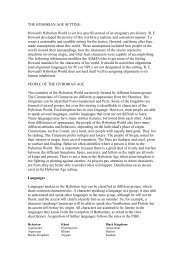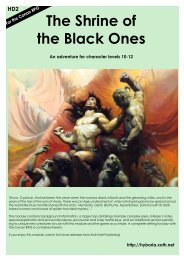Create successful ePaper yourself
Turn your PDF publications into a flip-book with our unique Google optimized e-Paper software.
<strong>The</strong> <strong>Savant</strong>: A variant Scholar class for the Conan RPG<br />
made after a time of study. <strong>The</strong> check DC<br />
and study time is determined by the<br />
Game Master. As a guideline, use a DC of<br />
20 + minimum caster level (determined by<br />
the spell’s prerequisites), and a study time<br />
of 1d4 weeks per two minimum caster<br />
levels (minimum 1 week).<br />
Ancient scrolls or guidance by a teacher<br />
provide bonuses to the Knowledge<br />
(arcana) check. Writings from the age of<br />
Atlantis provide a +8 bonus, while writings<br />
from the age of Acheron and Old Stygia<br />
provide a +6 bonus. A teacher provides a<br />
+1 bonus per five savant levels or demonic<br />
hit dice (maximum +4). <strong>The</strong>se bonuses do<br />
not stack; use only the highest bonus.<br />
For example, a scroll with the Dread<br />
Serpent spell found in an Old Stygian<br />
tomb has a Knowledge (arcana) DC of 28<br />
(minimum caster level 8) and takes 4d4<br />
weeks to study. Its age grants a +6 bonus<br />
to the savant’s skill check. If the spell was<br />
instead taught to an acolyte by a 10thlevel<br />
high priest, he would grant a +2<br />
bonus to the student’s skill check.<br />
In cultures where formal written languages<br />
do not exist (such as in parts of the Black<br />
Kingdoms), spells are written down and<br />
learned using pictograms and arcane<br />
symbols, so the same rules apply.<br />
Once learned, the savant does not need<br />
to study the written spell to cast it, but if<br />
required he can recreate a written copy<br />
from memory. Such copies do not provide<br />
any bonuses to students trying to learn the<br />
spell, so for this reason ancient scrolls are<br />
more prized than more recent copies.<br />
If the savant fails the Knowledge (arcana)<br />
check to learn the spell, the study time is<br />
wasted and he must wait until he gains a<br />
new level before he can attempt to learn<br />
it again. <strong>The</strong> savant cannot take 10 or 20<br />
on the Knowledge (arcana) check to<br />
learn a spell. During the study time, he<br />
must devote at least 8 hours per day to<br />
study, but can otherwise act freely for the<br />
remainder of that day. <strong>The</strong> total study<br />
period does not need to be continuous;<br />
for example, the savant can study a new<br />
spell for two weeks, then take a break for<br />
five weeks, and then continue where he<br />
left off.<br />
Pact: A savant who makes a pact with a<br />
demonic entity or other dark force to<br />
learn sorcery is in a very similar state to<br />
that of an acolyte to a sorcerers’ ring or<br />
coven, since he is often effectively in thrall<br />
to the source of his knowledge. He has a<br />
lot more choice as to what he learns;<br />
however, the master has no human<br />
compunctions to prevent him from forcing<br />
the poor savant to perform the direst of<br />
acts.<br />
Furthermore, he will begin the game at<br />
least somewhat corrupt, for no truly<br />
decent sorcerer makes pacts with de-<br />
Page 4<br />
mons. A savant with a pact begins the<br />
game with a Corruption of 1.<br />
At 1st level, he must choose the New<br />
Sorcery Style: Summoning and the spell<br />
Demonic Pact. He may choose either to<br />
do his own researches, in which case he<br />
must find and learn spells as though he<br />
were an independent, or else risk further<br />
Corruption by calling up the entity with<br />
whom he has the pact once more. If he<br />
does the latter, he may freely choose<br />
which style or spell he learns, so long as it is<br />
one the entity knows, but he must also<br />
make a Corruption check for dealing with<br />
the demon once more.<br />
A savant with a pact also starts the game<br />
with one additional bonus language<br />
available, as well as those offered him by<br />
his race. This is Demonic. He must expend<br />
a language slot as usual to learn to speak<br />
it.<br />
<strong>The</strong> Game Master is always free to rule<br />
that player character savants may not<br />
begin the game with a pact. This is particularly<br />
appropriate in short-term or oneoff<br />
campaigns, where the natural disadvantage<br />
of the pact savant (namely the<br />
Corruption he gains, which will someday<br />
almost certainly doom him, one way or<br />
another) may have little impact on play.<br />
This background is better balanced for<br />
longterm campaigns, offering immediate<br />
power at the cost of one’s soul, or worse.<br />
Lay Priest: <strong>Savant</strong>s who choose the lay<br />
priest background are attached to a<br />
temple for purposes of study but with little<br />
or no religious authority. If they wish, they<br />
can work their way up to the position of<br />
fully ordained priest (see the Feats chapter),<br />
which brings with it a number of<br />
benefits and responsibilities.<br />
Priests, whether they are lay priests or fully<br />
ordained, do not usually have access to<br />
sorcery at all; if they do, it is most commonly<br />
some form or other of countersorcery<br />
with which to combat evil cults.<br />
<strong>The</strong> precise nature of each priest and<br />
which magical abilities (if any) are available<br />
to him will vary depending on both<br />
the deity he worships and his own honesty<br />
– or lack of it.<br />
Priests are treated as acolytes in that they<br />
must gain sorcery styles known to their<br />
religion. <strong>The</strong>y do not usually need to learn<br />
their styles in a specific order but in most<br />
cases their religion will offer only a very<br />
limited selection of styles in the first place.<br />
Most higher-level priests have either<br />
conducted independent studies themselves<br />
in secret, or have even more<br />
secretly made a pact with a demon or<br />
joined a sorcerous society.<br />
<strong>The</strong> shamans found in barbaric regions<br />
such as the Pictish Wilderness can usually<br />
be treated as lay priests. A shaman might<br />
have the Priest feat but will not have had





